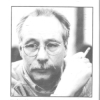W. G. Sebald

W. G. Sebald
Winfried Georg Sebald— known as W.G. Sebald or Max Sebald — was a German writer and academic. At the time of his death at the age of 57, he was being cited by many literary critics as one of the greatest living authors and had been tipped as a possible future winner of the Nobel Prize in Literature. In a 2007 interview, Horace Engdahl, former secretary of the Swedish Academy, mentioned Sebald, Ryszard Kapuściński and Jacques Derrida as three recently...
NationalityGerman
ProfessionWriter
Date of Birth18 May 1944
CountryGermany
A subject which at first glance seems quite removed from the undeclared concern of the book can encapsulate that concern.
Until I was 16 or 17, I had heard practically nothing about the history that preceded 1945. Only when we were 17 were we confronted with a documentary film of the opening of the Belsen camp.
I was brought up largely by my grandfather because my father only returned from a prisoner-of-war camp in 1947 and worked in the nearest small town, so I hardly ever saw him.
Occasionally I write a small piece or the odd lecture in English, and I teach in English, but my fiction is always written in German.
You could grow up in Germany in the postwar years without ever meeting a Jewish person. There were small communities in Frankfurt or Berlin, but in a provincial town in south Germany, Jewish people didn't exist.
I don't want to talk about my trials and tribulations. Once you reveal even part of what your real problems might be in life, they come back in a deformed way.
In school I was in the dark room all the time, and I've always collected stray photographs; there's a great deal of memory in them.
I always read the translator's draft all the way through - a very laborious business.
Comparing oneself with one's fellow writers is a bad idea. I would not review a fellow writer unless I had something terribly positive to say.
Places seem to me to have some kind of memory, in that they activate memory in those who look at them.
To my mind, it seems clear that those who have no memory have the much greater chance to lead happy lives. But it is something you cannot possibly escape: your psychological make-up is such that you are inclined to look back over your shoulder.
People's ability to forget what they do not want to know, to overlook what is before their eyes, was seldom put to the test better than in Germany at that time.
I've always felt that the traditional novel doesn't give you enough information about the narrator, and I think it's important to know the point of view from which these tales are told: the moral makeup of the teller.
Where I grew up, in a remote village at the back of a valley, the old still thought the dead needed attending to - a notion so universal, it's enscribed in all religions. If you didn't, they might exact revenge upon the living.